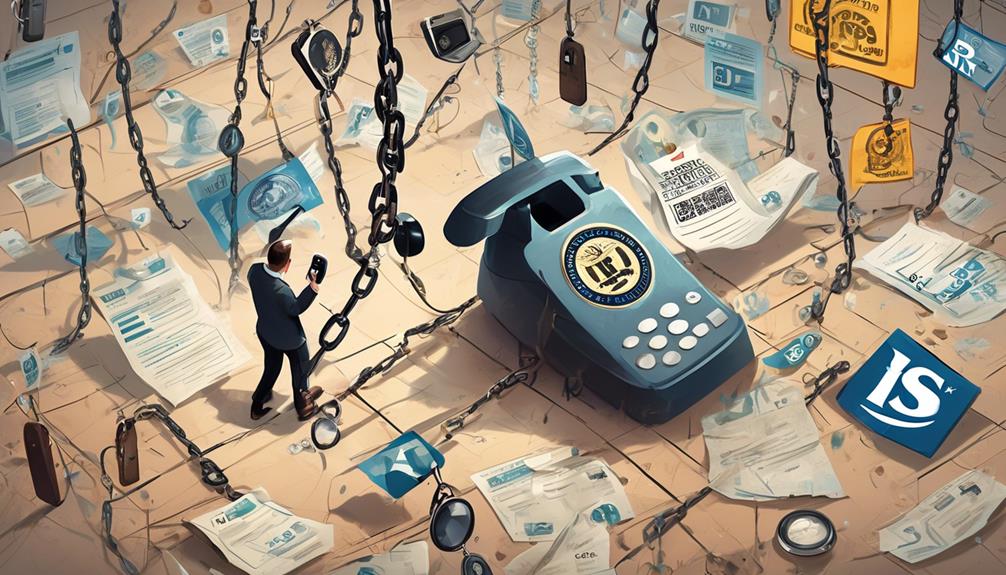As taxpayers receive more calls claiming to be from the IRS, distinguishing real from fake becomes vital. Indeed, the challenge is significant: can we outsmart these crafty impostors? Experts often suggest hanging up on suspicious calls. However, scammer techniques are ever-changing, making authenticity hard to verify.
This discussion presents nine practical tips to counteract tax scammer strategies. Knowing common scammer methods and IRS protocols is essential. Yet, it's the subtle fraud indicators that usually expose the truth. These include the urgency in a caller's voice, the dubious trustworthiness of Caller ID, or odd payment method requests. By recognizing these signs, one gains an advantage, prepared to face potential fraud without succumbing to fear or coercion.
Recognize Common Scammer Tactics

Scammers often use intimidation and pose as IRS agents. They manipulate victims into sharing personal information or making payments. Skilled in exploiting fear and urgency, they pressure individuals into harmful actions. These scammers target the most susceptible, like the elderly, immigrants, and the tax-illiterate.
Asserting authority, the con artists claim immediate action is needed for supposed tax debts. They insist on unconventional payment methods like gift cards or wire transfers. Such demands are red flags of fraud. Be cautious; the IRS never requires instant payment by phone, nor threats with law enforcement.
Belonging to a community means protecting each other. Sharing knowledge about these tactics helps everyone. It empowers us to defend ourselves and our loved ones. If unsure about a call's legitimacy, it's best to hang up and contact the IRS directly. Stay informed and vigilant to keep your community safe from these deceptions.
Know the IRS Contact Protocols
Understanding the IRS's official communication methods is vital. It can significantly reduce falling victim to fraud. Familiarize yourself with their protocols to identify suspicious contact. These protocols safeguard taxpayers and ensure clear communication. Here's essential information about IRS contact methods:
- Typically, the IRS first reaches out to taxpayers by mail, not phone.
- They send official correspondence via the United States Postal Service.
- Email contact from the IRS is uncommon and follows your initiation.
- They do not insist on immediate payment over the phone.
- Also, IRS agents won't threaten arrest or legal action for non-payment.
Being part of an informed community is crucial for safety. Sharing knowledge about these methods protects and supports others. The IRS operates with transparency and respects taxpayer rights. If you feel a call or message is suspicious, it probably violates IRS protocols.
Analyze the Caller's Urgency

One telltale sign of a fake IRS call is the caller's unwarranted sense of urgency, pushing you to act quickly and without due consideration. Scammers often employ immediate pressure, warning of dire consequences if you don't comply on the spot. They're banking on the fear that their threat tactics will override your better judgment.
It's vital to remember that the real IRS moves at a deliberate pace. They understand that tax matters can be complex and give you time to ask questions, seek advice, or even appeal decisions. If you're feeling rushed, there's a good chance it's not a legitimate IRS agent on the line.
Beware of callers demanding immediate payment, especially via specific methods like gift cards or wire transfers. The IRS will never insist that you use a particular payment method. They also won't threaten to bring in law enforcement or suggest dire consequences like immediate arrest.
Always take a moment to breathe and think. You have the right to pause and verify any claims being made. Scammers thrive on isolation — but remember, you're not alone. Reach out to a trusted advisor or directly to the IRS. By sharing your experiences, you also help create a sense of community awareness, protecting others from falling victim to similar scams.
Scrutinize Caller ID Reliability
Caller ID often lacks reliability, since scammers can easily spoof it. Therefore, it's crucial to confirm the caller's authenticity. Even when the ID appears legitimate, one should be cautious. Recognizing signs of a suspicious call can greatly help individuals. This vigilance is essential to avoid becoming a victim of fraud.
Understanding Caller ID Spoofing
Understanding Caller ID Spoofing is essential, as it's not always a reliable indicator of the caller's identity. Scammers frequently use spoofing techniques to hide their actual identity. Hence, comprehending the mechanics behind Caller ID spoofing is vital for one's protection against fraud.
- Caller ID Spoofing involves scammers masking their number to appear as a credible entity.
- The misuse of spoofing technology is rampant; deceitful software is easily accessible.
- Trusting your instincts is important; if a call seems dubious, it likely is.
- Always verify information independently; do not trust the caller-provided data for validation.
- Promptly report any call you suspect to be spoofed to the relevant authorities.
Verifying Caller Authenticity
Although Caller ID offers some assurance, it's crucial to actively verify a caller's authenticity. This prevents falling victim to phone scams. Caller verification extends beyond trusting the displayed name or number. Scammers often exploit this feature, gaining trust and extracting personal information. For identity confirmation, request that the caller provide information exclusive to the IRS. Yet, refrain from revealing any personal details first. If uncertain, terminate the call. Then, directly contact the IRS using their official website numbers. Importantly, the IRS usually initiates contact through mail, not by phone. By joining an informed community, one strengthens their ability to spot fraud. This creates a collective defense against deceitful schemes.
Recognizing Suspicious Call Signs
Scrutinizing the reliability of Caller ID is crucial, as scammers can easily manipulate it to appear as a legitimate IRS contact. They often employ spoofing techniques to deceive individuals into believing they're receiving a call from an official source. To be part of a vigilant community, one must be alert to suspicious phrases and caller intimidation tactics that are telltale signs of a scam.
- Be wary of Caller ID that displays "IRS" – it could be a spoof.
- Don't trust calls demanding immediate payment without written notice.
- Watch out for threats of arrest or lawsuits – these are intimidation tactics.
- Hang up if you're pressured to use specific payment methods.
- Question callers who aggressively demand tax payments over the phone.
Stay informed and protect yourself and your loved ones from these fraudulent schemes.
Request Written Documentation
One crucial step in verifying the legitimacy of an IRS call is to request official written correspondence. Taxpayers should be knowledgeable about how authentic IRS notices look and feel, seeking to authenticate any documentation received. They must insist on paper verification to prevent falling victim to sophisticated phone scams.
IRS Official Correspondence
When in doubt about the legitimacy of a call claiming to be from the IRS, always request written documentation, as the IRS typically communicates through official letters. Genuine IRS notices are a key part of correspondence authenticity, helping taxpayers verify the source of the information.
Here are five essential items to consider regarding IRS official correspondence:
- Official IRS letters or notices arrive by standard mail, not email.
- Real IRS notices include your tax ID number and specific details about your account.
- Each IRS correspondence provides a specific IRS phone number for inquiries.
- Authentic letters contain a notice or letter number, which is useful for verification.
- The IRS never demands immediate payment or personal information over the phone.
Always take the time to confirm any IRS contacts through these trusted methods.
Authenticating Written Notices
Understanding the significance of IRS official correspondence is essential. Consequently, it's vital to authenticate written notices to avoid fraud. Upon receiving a notice, promptly ascertain its legitimacy. Scrutinize for discrepancies in personal details, reference numbers, and the content. Authentic IRS documents exhibit a consistent, professional tone. They include precise tax terminology and straightforward instructions.
Moreover, practice document comparison. The IRS posts notice samples on their website. Compare any received notice with these examples to identify inconsistencies. If uncertain, directly contact the IRS through official channels. Importantly, the IRS won't demand immediate payment or threaten legal action without prior notice. By remaining alert, you defend against scammers preying on your law-abiding taxpayer identity.
Demand Paper Verification
To combat IRS fraud, always insist on written proof for phone-based tax claims. Importantly, this introduces a critical verification delay. Scammers typically avoid such delays. Furthermore, genuine IRS notices usually contain a unique confirmation code. This code helps confirm the request's legitimacy.
Here are five key tips to bear in mind:
- Ensure you request the official IRS letterhead for all correspondence.
- Do not trust callers who decline to provide written confirmation.
- Directly confirm the confirmation code with the IRS.
- Be cautious of pressing deadlines that prevent paper verification.
- Recognize that the IRS primarily initiates contact via mail, not phone calls.
Never Share Personal Information
Under no circumstances should you share sensitive personal info with unsolicited callers. Especially if they claim to be from the IRS. Personal security is pivotal; a guarded approach is essential for confidentiality. If a caller claims to be an IRS agent, be wary. Authentic IRS agents won't request your social security number or banking details by phone.
To ensure your safety, stay vigilant and resist pressure. Scammers often create urgency, pushing for quick decisions. They want you to act hastily, risking your data security. Don't succumb to their tactics.
Instead, disconnect the call. Then, contact the IRS directly to confirm any claims. This step is crucial for protecting your personal information. It also strengthens our collective defense against fraud. By sharing these tips, you help build a community knowledgeable in fraud prevention. Remember, protecting your details helps safeguard the entire community.
Be Wary of Payment Methods

While securing your personal information is the first line of defense, it's also critical to scrutinize the payment methods that callers claim the IRS requires. The IRS has specific protocols for tax payments, and deviation from these methods is a warning sign of fraudulent activity. Scam red flags often include unusual requests related to how you should settle a supposed tax debt.
Be alert for these scam red flags concerning payment methods:
- Demand for prepaid debit cards: The IRS never requires tax payments using prepaid debit cards.
- Request for wire transfers: This is not a standard IRS practice.
- Solicitation of credit card numbers over the phone: The IRS does not ask for credit card details during a call.
- Urging to use specific payment apps: If they specify a payment app by name, be suspicious.
- Payment to an individual or entity other than the U.S. Treasury: All legitimate tax payments are to be made to the U.S. Treasury.
Report Suspicious Phone Calls
If you receive a suspicious call impersonating the IRS, it's crucial to report it immediately to the appropriate authorities. Doing so not only helps protect your privacy but also contributes to the safety of the community. Fraudulent calls aren't just a personal inconvenience; they're a widespread issue that affects countless individuals.
Upon identifying a deceitful call, hang up and contact the Treasury Inspector General for Tax Administration (TIGTA) through their online reporting form or call 800-366-4484. Additionally, reporting the incident to the Federal Trade Commission (FTC) through the FTC Complaint Assistant is beneficial for broader consumer protection efforts.
Educate Yourself on Tax Scams

Educating yourself on tax scams is crucial. After reporting a dubious IRS call, it's vital to enhance your protection. Learn about common tax scams and their methods. Tax education isn't only about proper filings; it includes scam awareness too. By grasping scammer tactics, you can become a savvy taxpayer. This knowledge makes you less likely to be scammed.
Here are some essential points for better scam awareness:
- Impersonation Scams: Often, scammers will impersonate IRS agents. They use fictitious names and counterfeit IRS badge numbers. Be alert to this trick.
- Threatening Language: Beware of calls that use threats. These may include arrest, deportation, or revoking your license if immediate payment isn't made.
- Demands for Specific Payment Methods: Remember, the IRS won't insist on payment via gift cards, prepaid cards, or wire transfers.
- Requests for Personal Information: The IRS doesn't reach out via email, texts, or social media for personal data. Always keep this in mind.
- Unsolicited Emails: Avoid opening attachments or clicking links in suspicious emails. Especially those that falsely claim to be from the IRS.
Frequently Asked Questions
How Can I Verify the Identity of an IRS Employee if I Have an Ongoing Issue With My Taxes and Expect Legitimate Contact?
Consequently, she intends to contact the IRS directly to authenticate the caller. She will provide her details to verify her taxpayer identity. This ensures communication with a legitimate agent, avoiding scams.
Are There Any Legitimate Situations Where the IRS Would Contact Me via Phone FIRSt Instead of Mail?
The IRS typically initiates contact through mail, honoring taxpayer rights. However, in uncommon instances, they may phone for audits or delinquent taxes. Consequently, they adhere to stringent communication guidelines, fostering community trust.
What Steps Should I Take if I Accidentally Gave Personal Information to a Suspected Scammer?
If someone has disclosed personal information to a scammer, immediate action is necessary. Consequently, they should promptly report the fraud. Additionally, safeguarding their identity is vital. Acting speedily is essential to limit potential harm.
Can the IRS Take Legal Action Against Me if I Hang up on a Call I Suspect to Be Fraudulent, but Turns Out to Be Legitimate?
No, terminating the call won't result in legal repercussions. Understanding the prevalence of scams, the IRS overlooks such caution-driven missteps. Consequently, they'll employ different communication methods if their call was authentic.
Are There Any Smartphone Apps or Tools That Can Help Me Identify and Block Potential IRS Scam Calls?
She has discovered that apps featuring Caller ID Verification and Fraud Alert Systems are effective. Consequently, these tools block scam calls. They provide community safety, which is reassuring for individuals concerned about IRS scam schemes.
Conclusion
In conclusion, arm yourself against swindlers pretending to be IRS agents. Remain unwaveringly vigilant and recognize their deceitful tactics. Moreover, always demand concrete evidence of their claims. Protect your personal information zealously, as a dragon guards its gold. When in doubt, don't hesitate to report them with diligence. Furthermore, remember that the true IRS operates with deliberation, much like a tortoise. In contrast, scammers often act with undue haste, similar to a hare. Stay informed and maintain a healthy skepticism. In doing so, you become an impenetrable fortress, safeguarding against tax scams.



